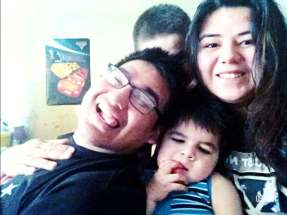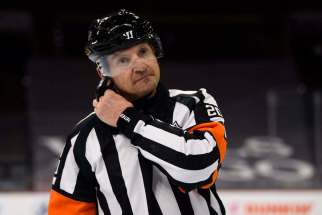Tripped up by penalty talk NHL referee 'game management' likely won't change
Read this article for free:
or
Already have an account? Log in here »
To continue reading, please subscribe:
Monthly Digital Subscription
$0 for the first 4 weeks*
- Enjoy unlimited reading on winnipegfreepress.com
- Read the E-Edition, our digital replica newspaper
- Access News Break, our award-winning app
- Play interactive puzzles
*No charge for 4 weeks then price increases to the regular rate of $19.00 plus GST every four weeks. Offer available to new and qualified returning subscribers only. Cancel any time.
Monthly Digital Subscription
$4.75/week*
- Enjoy unlimited reading on winnipegfreepress.com
- Read the E-Edition, our digital replica newspaper
- Access News Break, our award-winning app
- Play interactive puzzles
*Billed as $19 plus GST every four weeks. Cancel any time.
To continue reading, please subscribe:
Add Free Press access to your Brandon Sun subscription for only an additional
$1 for the first 4 weeks*
*Your next subscription payment will increase by $1.00 and you will be charged $16.99 plus GST for four weeks. After four weeks, your payment will increase to $23.99 plus GST every four weeks.
Read unlimited articles for free today:
or
Already have an account? Log in here »
Hey there, time traveller!
This article was published 24/03/2021 (1720 days ago), so information in it may no longer be current.
Tim Peel wasn’t sent packing by the NHL for calling a dubious tripping penalty on Nashville’s Viktor Arvidsson on Tuesday night. No, the veteran referee’s real sin — at least in the eyes of his employer — was getting caught on a live microphone revealing to a worldwide audience how the sausage was made.
In this case, the long-held and not-very-pretty practice of game management, a major systemic flaw in which officials repeatedly change the standard of what is and isn’t a foul and take a selective stance based entirely on the situation, the scoreboard and the stakes.
“It wasn’t much, but I wanted to get a f—–g penalty against Nashville early in the…,” Peel could be heard saying on the TV broadcast before the audio abruptly cut out. At the time, the Predators were leading Detroit 1-0, courtesy of a first-period power play goal. And the call on Arvidsson at 4:56 of the middle frame was as predictable as the sun rising tomorrow.
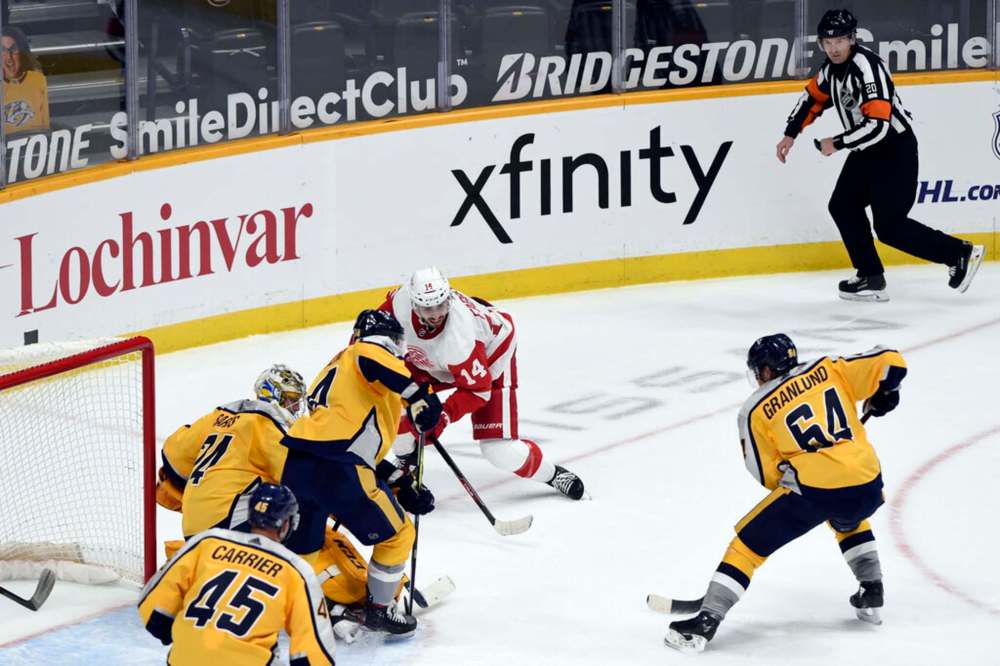
In Peel’s mind, he clearly felt he had to give the Red Wings a chance to “make good,” and so he went looking for even the most ticky-tack thing he could spot, while no doubt turning a blind eye, at least for the time being, to any laws of the land Detroit might wish to violate.
It’s a tale as old as time — and one the NHL has still failed to address despite handing Peel his walking papers on Wednesday. The 53-year-old veteran of 1,361 regular-season games won’t get to work a 1,362nd, nor will he get his swan song next month in his hometown of St. Louis in what was slated to be his retirement game.
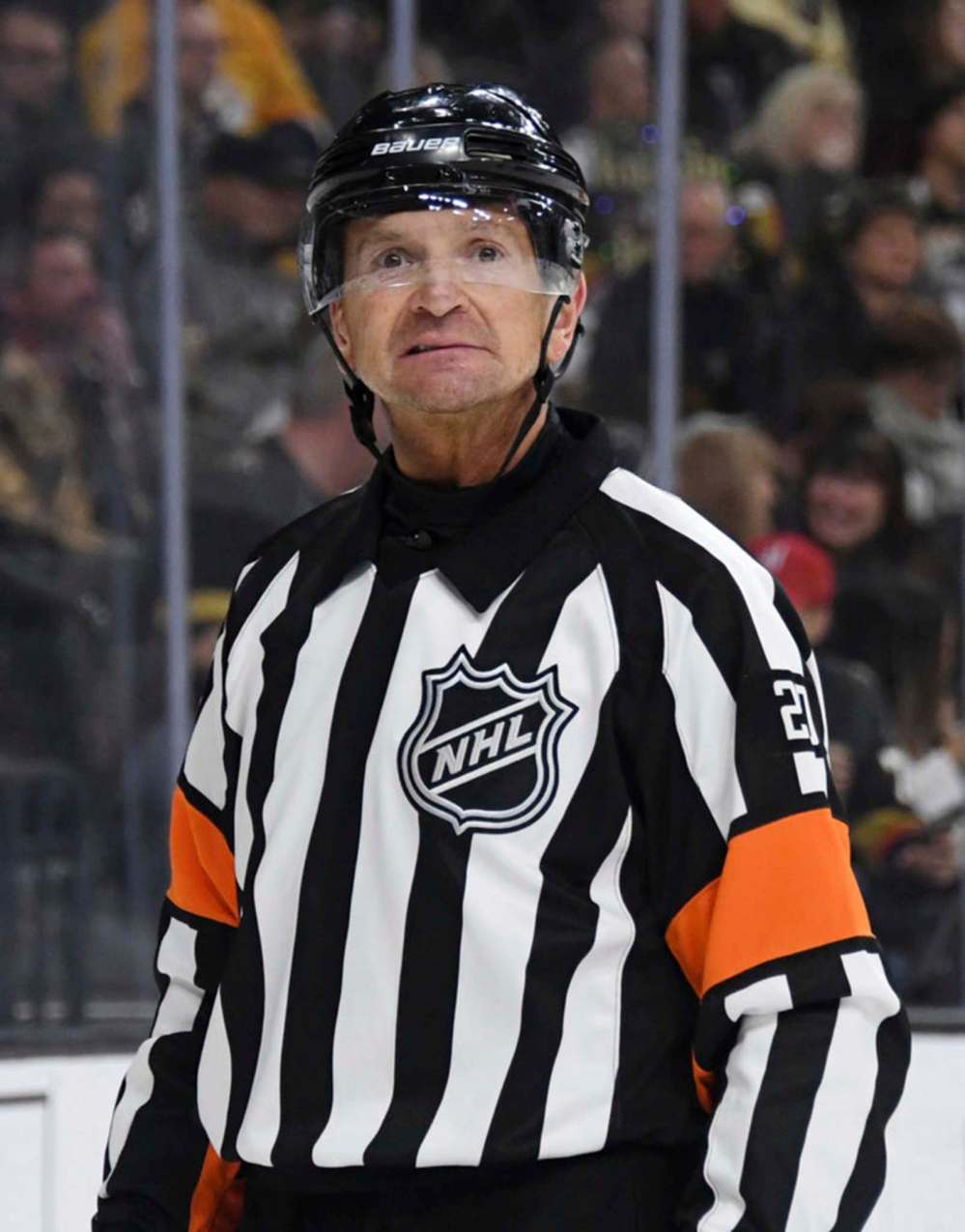
Oh sure, the league talked a good game, puffing out its chest with a canned statement from Colin Campbell, the senior vice-president of hockey operations, about how “nothing is more important than ensuring the integrity of our game.” In reality, they’re just blowing the whistle on themselves and how little they truly follow their own rulebook at times, and how it often turns the games into something resembling Vince McMahon’s scripted sports entertainment product in WWE.
In a perfect world, a penalty in the first period of a pre-season game should be a penalty in overtime of Game 7 of the Stanley Cup Final. It shouldn’t matter if one team takes 10 minors in a game, while the other are perfect angels who stay out of the sin bin entirely. Nor should it matter if it’s a blowout or a tie game. Just call ’em as you see ’em, which is the case in every other pro sports league.
The NHL said nothing on that front Wednesday. Because none of that actually happens in their world, nor does there seem to be any plan to ensure it happens going forward, save for what I suspect might be a barrage of calls in the coming days with everyone now on their best behaviour given the increased, unwanted attention. And while the quantity may briefly go up, there’s a good chance you can pretty much split it right down the middle.
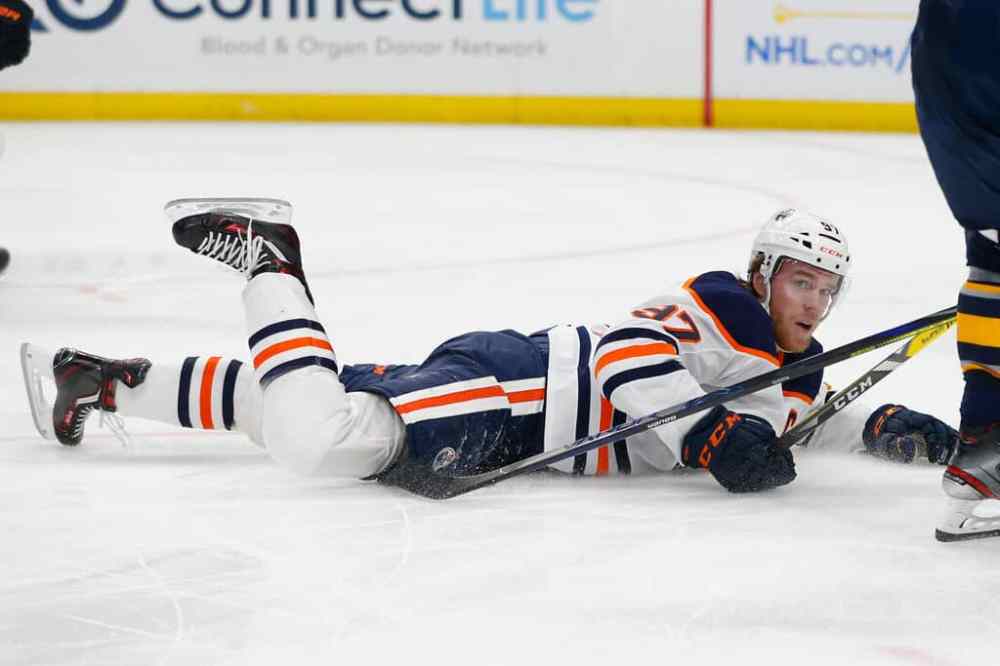
The website scoutingtherefs.com says over the past five years, home teams get 52 per cent of power plays, road teams 48 per cent. That is regardless of the disparity in talent or performance. Connor McDavid, the fastest player in the game, can attest to that. You know the opponent is probably good for one or two penalized muggings of him per game, but after that officials often swallow the whistle.
If the league truly intends to “take any and all steps necessary to protect the integrity of our game,” they would come clean on how this age-old practice of trying to keep everything fair and balanced — which is obvious to even the most casual fan — must stop immediately.
Peel didn’t do anything different than what he and his fellow colleagues in stripes have been doing for decades. He was just guilty of failing to properly manage his microphone. Had he simply uttered these words privately — Nashville’s Matt Duchene revealed Peel was actually saying this to their bench! — it would have been no big deal. Same as it ever was. The Predators, as justified as they would have been to complain to NHL brass, would have been laughed at had they tried.
I’ll say this in defence of NHL referees. The game has never been more difficult to officiate. It’s faster than ever, with an emphasis on skill, and the ability to analyze every call in super-slow-motion in high-definition from every possible angle, combined with the immediate sounding board that is social media, has brought more scrutiny that never. As Jets coach Paul Maurice said on Wednesday, “I’m really, really glad it’s not my job.”
Curiously enough, it also seems there’s no real appetite for meaningful change among many players, coaches and managers — at least ones not named McDavid.
“I think there’s definitely a regular-season versus a playoff standard, it feels like, which is normal and I think what we want,” said Jets forward Andrew Copp. “I think the intensity is ramped up in the playoffs, so there’s not maybe as many calls. Then in the regular season, maybe you see a few more called. I don’t really have a problem with that. Consistency across the board in-game is the biggest thing. I think that’s what we look for as players.”
“I think there’s definitely a regular-season versus a playoff standard, it feels like, which is normal and I think what we want.”
– Winnipeg Jets’ Andrew Copp
Peel is just a convenient scapegoat, and an easy one at that. A younger, more respected ref who didn’t already have one foot out the door likely wouldn’t have received the same harsh treatment. The fact Peel worked just 90 playoff games over his 26-year career, and none in the Stanley Cup Final, tells you he repeatedly scored low on the league’s own internal rankings. The best officials, year in and year out, get the plum assignments. And Peel was almost always left out in the cold.
He was the subject of ridicule and scorn, and an eventual one-game suspension, after he met ESPN writer Greg Wyshynski in a New York bar back in 2015 to throw back shooters and talk shop — specifically about Wyshynski’s repeated criticism of his on-ice work.
“I think the officials have a tough job; it’s a thankless job, right? They are always in a pretty tough position. I think you see games where there are a lot of penalties called, and then there are games where they just let us play. But it really just depends on the official. I think Tim made a mistake, obviously he shouldn’t have said that. But at the same time, I think everyone makes mistakes,” said Jets forward Nate Thompson.
“Do I think he should have lost his job over it? I don’t think so. But you know, that’s the league’s call. It’s unfortunate, but at the same time there is no place for that in the game.”
For an accidental hot mic? No, apparently not. But for the questionable practice of game management? Until we see evidence to the contrary, it’s likely going to be status quo on that front.
mike.mcintyre@freepress.mb.ca
Twitter: @mikemcintyrewpg

Mike McIntyre grew up wanting to be a professional wrestler. But when that dream fizzled, he put all his brawn into becoming a professional writer.
Our newsroom depends on a growing audience of readers to power our journalism. If you are not a paid reader, please consider becoming a subscriber.
Our newsroom depends on its audience of readers to power our journalism. Thank you for your support.

